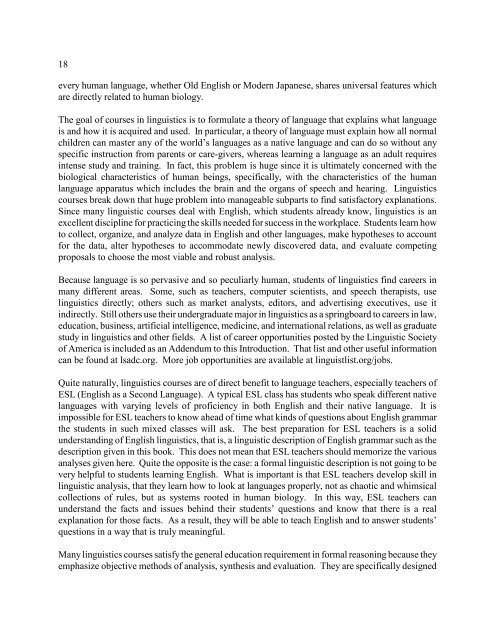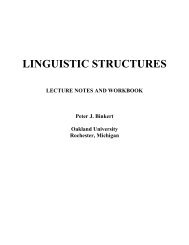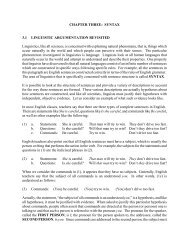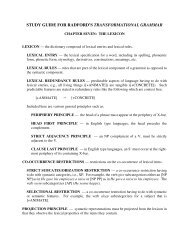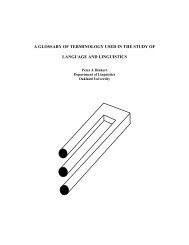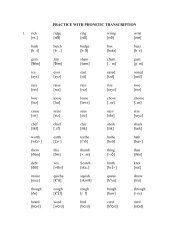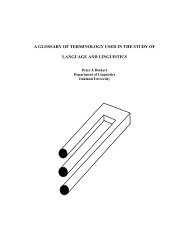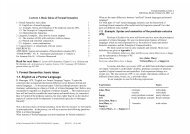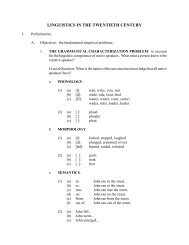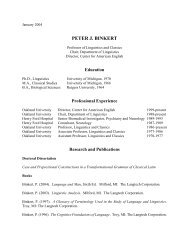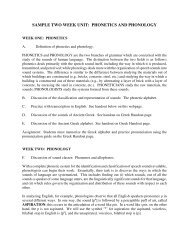- Page 1 and 2: LINGUISTIC ANALYSIS LECTURE NOTES A
- Page 3 and 4: PREFACE This book is not a traditio
- Page 5 and 6: TABLE OF CONTENTS Preface. . . . .
- Page 7 and 8: 3.3 Traditional and Structural Gram
- Page 9 and 10: INTRODUCTION: LINGUISTICS AND THE J
- Page 11 and 12: college and career readiness (The M
- Page 13 and 14: (3) a. Should colleagues be discipl
- Page 15 and 16: elationship between gas mileage and
- Page 17 and 18: Several years ago, Ford Motor Compa
- Page 19 and 20: Since the principles in (9) are obj
- Page 21 and 22: Now notice that there are actually
- Page 23 and 24: Since language is a product of huma
- Page 25: Native speakers of English understa
- Page 29: Work for an advertising company: Co
- Page 32 and 33: 24 Again, there is a specific princ
- Page 34 and 35: 26 When people read the sentences i
- Page 36 and 37: 28 1.2 THE BRANCHES OF GRAMMAR AND
- Page 38 and 39: 30 (28) a. Mary fell... *under the
- Page 40 and 41: 32 of the language gets into the ch
- Page 42 and 43: 34 c. Time Three - about three mont
- Page 44 and 45: 36 in all areas of development, inc
- Page 46 and 47: 38 judgements about grammar, which
- Page 48 and 49: 40 1.6 LINGUISTIC ARGUMENTATION Lin
- Page 50 and 51: 42 The diagram in (37) is a proposa
- Page 52 and 53: 44 or, at least, readily clear afte
- Page 54 and 55: 46 1.7 UNIVERSAL GRAMMAR (UG) The d
- Page 56 and 57: 48 UG contains two types of univers
- Page 58 and 59: 50 While languages do have syntacti
- Page 60 and 61: 52 At the level of descriptive adeq
- Page 62 and 63: 54 verification for this distributi
- Page 64 and 65: 56 the p’s in tiptop). Therefore,
- Page 66 and 67: 58 (74) a. [Something] pleased the
- Page 68 and 69: 60 1.10 THE GENERALITY OF LINGUISTI
- Page 70 and 71: 62 As a third example of the genera
- Page 72 and 73: 64 As a fifth example of the genera
- Page 74 and 75: 66 c. Ungrammatical and Unacceptabl
- Page 76 and 77:
68 (98) RIGHT BRANCHING CONSTRUCTIO
- Page 78 and 79:
70 1.12 LANGUAGE VARIATION All huma
- Page 80 and 81:
72 Why not form direct questions in
- Page 82 and 83:
74 1.14 TYPES OF LANGUAGES It is na
- Page 84 and 85:
76 (116) AMBIGUITY (one sound, more
- Page 86 and 87:
78 Or consider which of the followi
- Page 88 and 89:
80 Neurological Changes Let us cons
- Page 90 and 91:
82 animals can do; therefore, it is
- Page 92 and 93:
84 We do not find such optimally ef
- Page 94 and 95:
86 thing, i.e., ambiguities like (1
- Page 96 and 97:
88 EXERCISES FOR CHAPTER ONE 1. Wha
- Page 98 and 99:
90 5. Find the words which express
- Page 100 and 101:
92 Can you think of other ways of d
- Page 102 and 103:
94 FIGURE ONE: THE VOCAL APPARATUS
- Page 104 and 105:
96 feature [±ROUND] to distinguish
- Page 106 and 107:
98 MANNER OF ARTICULATION STOP [-VO
- Page 108 and 109:
100 2.1.2.4 NASALS A fourth group o
- Page 110 and 111:
102 FIGURE SIX: DISTINCTIVE FEATURE
- Page 112 and 113:
104 articulation, but they are diff
- Page 114 and 115:
106 As these examples show, a sylla
- Page 116 and 117:
108 In examining English, phonologi
- Page 118 and 119:
110 [2] [+ASPIRATED] considerable b
- Page 120 and 121:
112 The necessity for both levels o
- Page 122 and 123:
114 2.3 PHONOTACTICS Further invest
- Page 124 and 125:
116 Morphemes have different phonet
- Page 126 and 127:
118 Notice that (30) involves a cha
- Page 128 and 129:
120 (32) a. The PST morpheme in Eng
- Page 130 and 131:
122 (45) a. If a suffix and the fin
- Page 132 and 133:
124 Vowels have many redundant feat
- Page 134 and 135:
126 Similarly, silent letters frequ
- Page 136 and 137:
128 VOWELS: SUMMARY OF ENGLISH SOUN
- Page 138 and 139:
EXERCISES FOR CHAPTER TWO 1. Transc
- Page 140 and 141:
132 2. Transcribe the following Eng
- Page 142 and 143:
134 runaway Saturday ricochet prot
- Page 144 and 145:
136 h. tense high front unrounded v
- Page 146 and 147:
138 b. Nontense vowels in the final
- Page 148 and 149:
140 12. Consider the following addi
- Page 150 and 151:
142 weird feared veered cared cord
- Page 152 and 153:
144 3. agree debris ennui Pawnee ma
- Page 154 and 155:
146 APPENDIX B: PHONOLOGICAL RULES
- Page 156 and 157:
148 d. e. 8. a. Nasalize all vowels
- Page 158 and 159:
150 APPENDIX D: PHONOLOGY PROBLEM D
- Page 160 and 161:
152 APPENDIX F: ENGLISH VOWEL SHIFT
- Page 162 and 163:
154 (3) Root /fræg/ ‘break’: a
- Page 164 and 165:
156 about commands, people often as
- Page 166 and 167:
158 verified or falsified through a
- Page 168 and 169:
160 so the example is ambiguous. We
- Page 170 and 171:
162 3.2 ORDERING CONSTRAINTS With t
- Page 172 and 173:
164 OMISSION is the deletion of a p
- Page 174 and 175:
166 3.2.2 THREE OTHER DIAGNOSTICS T
- Page 176 and 177:
168 Given the reality of the chunk
- Page 178 and 179:
170 If AUX is part of the VERB PHRA
- Page 180 and 181:
172 (69) a. Generally the passenger
- Page 182 and 183:
174 (74) a. The new tenor from Ital
- Page 184 and 185:
176 Additional facts about tense th
- Page 186 and 187:
178 3.5 DETERMINERS AND THE INTERNA
- Page 188 and 189:
180 The grammar we are developing m
- Page 190 and 191:
182 In other words, determiners and
- Page 192 and 193:
184 constituents; braces indicate a
- Page 194 and 195:
186 3.6 THE ENDOCENTRICITY CONSTRAI
- Page 196 and 197:
188 3.7 THE LEXICON In order to gen
- Page 198 and 199:
190 (128) a. We made double the pro
- Page 200 and 201:
192 Astronomy is one of the oldest
- Page 202 and 203:
194 If we attempt to diagram the NP
- Page 204 and 205:
196 Note that each bracket on the l
- Page 206 and 207:
198 The data that we have observed
- Page 208 and 209:
200 Given these structures, we can
- Page 210 and 211:
202 The problem with the structures
- Page 212 and 213:
204 b. He decided on the boat. (on
- Page 214 and 215:
206 With this revision, we can diag
- Page 216 and 217:
208 With all the above revisions, i
- Page 218 and 219:
210 Summarizing, we have the follow
- Page 220 and 221:
212 The feature [+VBL] specifies th
- Page 222 and 223:
214 Within a particular kind of phr
- Page 224 and 225:
216 Since all categories on the X2
- Page 226 and 227:
218 (208) a. The school shows play
- Page 228 and 229:
220 The representations in (212) an
- Page 230 and 231:
222 Observe again that, by conventi
- Page 232 and 233:
224 In Japanese, a head final langu
- Page 234 and 235:
226 The complete RG morphosyntactic
- Page 236 and 237:
228 Given (231), we have solved the
- Page 238 and 239:
230 The need for three X levels abo
- Page 240 and 241:
232 The three level hypothesis for
- Page 242 and 243:
234 c. The boys made good models. [
- Page 244 and 245:
236 are two types of verbs in Engli
- Page 246 and 247:
238 3.14 NONTRANSFORMATIONAL GENERA
- Page 248 and 249:
240 The phrase “immediately C-com
- Page 250 and 251:
242 3.16 EMPTY CATEGORIES As we hav
- Page 252 and 253:
244 (285) a. What i did the teacher
- Page 254 and 255:
246 Note that the matter is not sim
- Page 256 and 257:
248 (308) a. John pushed the door o
- Page 258 and 259:
250 Returning to the main theme, su
- Page 260 and 261:
252 c. VOS. [ [ [ [ [ amat] ][ PRS]
- Page 262 and 263:
254 3.17.3 THE ORDERING OF V1 CONST
- Page 264 and 265:
256 This frame says that the order
- Page 266 and 267:
258 (352) a. He needs to give vent
- Page 268 and 269:
260 f. Further examples of particip
- Page 270 and 271:
262 3.18.2 PROBLEMS WITH THE CLASSI
- Page 272 and 273:
264 This do must be distinguished f
- Page 274 and 275:
266 If we treat be as a main verb a
- Page 276 and 277:
268 The above analysis solves a mul
- Page 278 and 279:
270 (398) a. Have they done that? b
- Page 280 and 281:
272 Given (408), we see that all us
- Page 282 and 283:
274 3.18.5 PARSES ILLUSTRATING THE
- Page 284 and 285:
276 (422) Present Tense + Perfectiv
- Page 286 and 287:
278 (425) Conditional Tense + Perfe
- Page 288 and 289:
280 (427) Conditional Tense + Perfe
- Page 290 and 291:
282 EXERCISES FOR CHAPTER THREE 1.
- Page 292 and 293:
284 Provide disambiguating diagrams
- Page 294 and 295:
286 APPENDIX A: ANSWERS TO EXERCISE
- Page 296 and 297:
288 h. The boy could take the garba
- Page 298 and 299:
290 4. All of the following sentenc
- Page 300 and 301:
292 (2) = The man will look the str
- Page 302 and 303:
294 7. Draw RG diagrams for the fol
- Page 304 and 305:
296 h. The boy could take the garba
- Page 306 and 307:
298 c. They will probably read the
- Page 308 and 309:
300 b. Ron left the house messy. (1
- Page 310 and 311:
302 d. The prisoner of war spoke fo
- Page 312 and 313:
304 APPENDIX B: LATIN SYNTAX Latin
- Page 314 and 315:
306 APPENDIX C: SUMMARY OF TREE STR
- Page 316 and 317:
308 7. Sentence with an intransitiv
- Page 318 and 319:
310 DEMONSTRATIVE PRONOUNS are used
- Page 320 and 321:
312 MORPHOLOGY Most grammars divide
- Page 322 and 323:
314 SUPPLEMENT TWO (PART I): TYPOLO
- Page 324 and 325:
316 GERMANIC: SUPPLEMENT THREE (PAR
- Page 326 and 327:
318 SUPPLEMENT FOUR (PART I): LANGU
- Page 328 and 329:
320 SUPPLEMENT FOUR (PART III): IND
- Page 330 and 331:
322 SUPPLEMENT FOUR (PART V): OTHER
- Page 332 and 333:
324 Luiseño [II] Luo [I] Maasai [I
- Page 334 and 335:
326
- Page 336 and 337:
328 (2) TRANSITIVE (DIRECT OBJECT C
- Page 338 and 339:
330 (4) COPULATIVE (PREDICATE COMPL
- Page 340 and 341:
332 (6) INTRANSITIVE WITH PREDICATE
- Page 342 and 343:
334 (8) TRANSITIVE (DIRECT OBJECT +
- Page 344 and 345:
336 b. TRANSITIVE (DIRECT OBJECT +
- Page 346 and 347:
338 (11) TRANSITIVE (DIRECT OBJECT
- Page 348 and 349:
340 (13) TRANSITIVE (DOUBLE OBJECT)
- Page 350 and 351:
342 (15) TRANSITIVE (SENTENTIAL COM
- Page 352 and 353:
344 The clause “I know that man i
- Page 354 and 355:
346 (18) TRANSITIVE (SENTENTIAL COM
- Page 356 and 357:
348 (20) TRANSITIVE (SENTENTIAL COM
- Page 358 and 359:
350 (22) TRANSITIVE (DIRECT OBJECT
- Page 360 and 361:
352 (24) TRANSITIVE (DIRECT OBJECT
- Page 362 and 363:
354 (26) TRANSITIVE (DIRECT OBJECT
- Page 364 and 365:
356 (28) INTRANSITIVE (PREPOSITIONA
- Page 366 and 367:
358 (30) TRANSITIVE (PARTICLE + DIR
- Page 368 and 369:
360 (32) TRANSITIVE (DIRECT OBJECT
- Page 370 and 371:
362 (34) TRANSITIVE (DIRECT OBJECT
- Page 372 and 373:
364 (36) TRANSITIVE (PREPOSITIONAL
- Page 374 and 375:
366 (2) The kitchen appliance facto
- Page 376 and 377:
368 (6) The soprano from a small to
- Page 378 and 379:
370 (2) We believe John to be compl
- Page 380 and 381:
372 SUPPLEMENT TEN: SAMPLE PARSES F
- Page 382 and 383:
374 (3) Gerundial Nominals (-ing) a
- Page 384 and 385:
376 (5) TRANSITIVE (DIRECT OBJECT +
- Page 386 and 387:
378 (7) TRANSITIVE (DIRECT OBJECT +
- Page 388 and 389:
380 The clause “I heard the tenor
- Page 390 and 391:
382 (4) Structural Representation:
- Page 392 and 393:
384 (9) Binding Relations: a. Chain
- Page 394 and 395:
386 k. The Subject Exclusion Condit
- Page 396 and 397:
388 (8) X3 elements are SPECIFIERS
- Page 398 and 399:
390 (11) TG (Transformational Gramm
- Page 400 and 401:
392 (13) RG (Residential Grammar) A
- Page 402 and 403:
394 MERGING FRAMES Merge 138 & 330
- Page 404 and 405:
396
- Page 406 and 407:
398 Bresnan, Joan. 1973. “The Syn
- Page 408 and 409:
400 Halle, Morris, Joan Bresnan, an
- Page 410 and 411:
402
- Page 412 and 413:
404 1. Evidence for cerebral latera
- Page 414 and 415:
406 11. A major defect of quantitat
- Page 416 and 417:
408 21. Which of the following is a
- Page 418 and 419:
410 32. When linguists attempt to r
- Page 420 and 421:
412 43. Pivot words are a. high in
- Page 422 and 423:
SAMPLE TEST TWO LIN 180: LINGUISTIC
- Page 424 and 425:
416 5. Which of the following is th
- Page 426 and 427:
418 13. Which of the following is a
- Page 428 and 429:
420 21. Consider the following rule
- Page 430 and 431:
422 26. Which of the following rule
- Page 432 and 433:
424 30. The word indescribable has
- Page 434 and 435:
426 36. Which of the following is c
- Page 436 and 437:
428 43. Which of the following rule
- Page 438 and 439:
430 47. Which of the following feat
- Page 440 and 441:
SAMPLE TEST THREE LIN 180: LINGUIST
- Page 442 and 443:
3. Consider the following sentences
- Page 444 and 445:
8. In terms of all that we have dis
- Page 446 and 447:
12. Which of the following noun phr
- Page 448 and 449:
17. Which of the following sets of
- Page 450 and 451:
THE NEXT FOUR QUESTIONS (24 - 27) R
- Page 452 and 453:
30. If a sentence has the above str
- Page 454 and 455:
37. Which of the following is corre
- Page 456 and 457:
44. Which of the following sentence
- Page 458 and 459:
SAMPLE TEST FOUR LIN 180: LINGUISTI
- Page 460 and 461:
3. Consider the following sentences
- Page 462 and 463:
8. In terms of all that we have dis
- Page 464 and 465:
12. Which of the following sentence
- Page 466 and 467:
17. Which of the following sets of
- Page 468 and 469:
THE NEXT FOUR QUESTIONS (24 - 27) R
- Page 470 and 471:
30. If a sentence has the above str
- Page 472 and 473:
37. Which of the following nodes C-
- Page 474 and 475:
44. Which of the following is part
- Page 476 and 477:
INDEX Abstract Noun. . . . . . . .
- Page 478 and 479:
Exclamatory. . . . . . . . . . . .
- Page 480 and 481:
Natural Class. . . . . . . . . . .
- Page 482 and 483:
Release. . . . . . . . . . . . . .
- Page 484 and 485:
THE LANGTECH PARSER Enter a sentenc
- Page 486:
478


